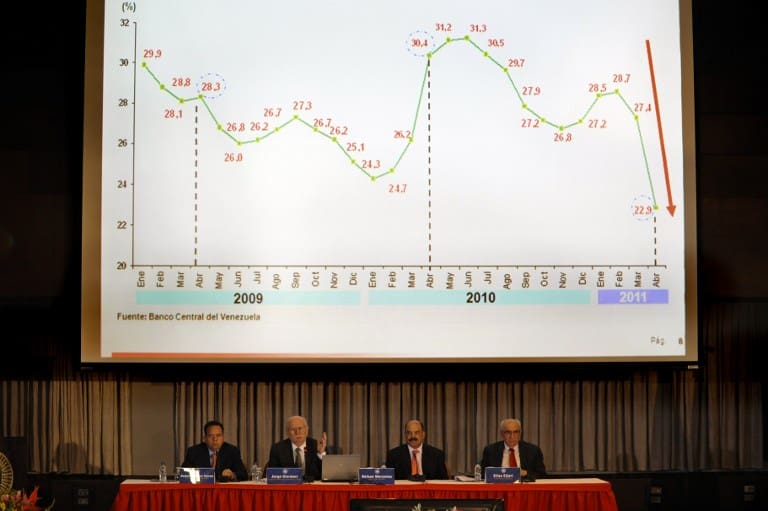CARACAS, Venezuela – Venezuelan President Nicolás Maduro is turning to an army brigadier general to run the economy, two months after using troops to help control prices and slow the world’s fastest inflation.
Rodolfo Marco Torres was named finance minister Wednesday, replacing Nelson Merentes, whose attempts to improve relations with the business community failed to prevent inflation doubling to 56 percent during his nine months in office. Merentes will return to head the country’s central bank, Maduro said in a state of the nation address to congress.
Active or retired officers now control a quarter of Maduro’s Cabinet as he looks to shore up their support after the death of former President Hugo Chávez, according to Rocio San Miguel, president of Caracas-based security research organization Citizens’ Control. Their increasing role indicates greater state involvement in the economy and prompted bonds to fall to a five-week low Thursday.
“The military men believe in the planned economy to propel development,” Asdrubal Oliveros, director of Caracas-based consultancy Ecoanalitica, said in telephone interview. “The officers in government tend to resolve problems with decrees, controls and inspections.”
The government will impose a maximum 30 percent profit margin across all industries via a presidential decree issued Thursday, and the country will work to reform its currency distribution system this year, Maduro said. The official exchange rate of 6.3 bolivars per dollar will remain, he said, even as the black market rate tumbles to 74.
Venezuela’s benchmark bond due in 2027 fell 1.63 cents to 74.07 cents on the dollar at 10:02 a.m. in New York, the lowest level since Dec. 4.
Military officers already head the ministries of defense, interior, air and aquatic transport, finance, and industry.
“Maduro has to cede power to the military because he doesn’t have the loyalty of the Armed Forces enjoyed by Hugo Chávez,” San Miguel said by telephone.
Maduro used troops to enforce price cuts in electronic stores in November, saying companies are overcharging consumers.
Torres, who was previously public banking minister, is the president of three state-owned banks including Banco de Venezuela, the country’s largest bank by assets, which provide subsidized mortgages and loans for key economic sectors.
A foreign trade body will absorb the state currency board known as Cadivi, Maduro said Wednesday, without providing additional details. A secondary foreign exchange system known as Sicad, that last sold dollars at 11.36 bolivars, will be strengthened, Maduro said, adding that more announcements about the country’s currency system will be made in the coming days.
“Maintaining the official exchange rate while strengthening the higher, secondary rate shows we are heading towards a dual exchange system this year,” Ronald Balza, economics professor at Andres Bello Catholic University in Caracas, said by telephone from Caracas Thursday. “The sustainability of the system will depend on the speed at which the government moves new sectors of the economy to the Sicad rate.”
The bolivar’s 73 percent decline against the dollar on the black market last year is worsening shortages of food and consumer goods in a country with the world’s biggest oil reserves, adding pressure on Maduro’s government to devalue.
On the black market, one dollar currently sells for about 74 bolivars, according to dolartoday.com, a website that tracks the exchange rate on the Colombian border.
Shortages of foreign currency have emptied Venezuelan shops of everything from razor blades to milk as importers struggle to get dollars.
Maduro said Wednesday that any company suspected of misusing foreign currency would not receive any new allocations at the official rate and that he’d increase punishments for “price speculators” he accuses of waging an “economic war.”
“For those that underestimate me, I say I’m a socialist and I know what I’m doing,” Maduro said, adding that 2013 had been a difficult year after the death of Chávez in March from an undisclosed form of cancer.
The National Assembly in November approved a so-called enabling law, granting Maduro the power for one year to enact laws, such as limits on profits, without the oversight of congress.
Rafael Ramírez, who is oil minister, president of state oil company Petroleos de Venezuela, and economy vice president, was ratified in his posts, Maduro said. The South American country is willing to improve its relationship with the United States, he added.
Maduro, who spoke for about four hours, said he instructed television regulator Conatel to review all content broadcast in the country, on both free and subscription channels, to construct a “culture of peace.”
© 2013, Bloomberg News







